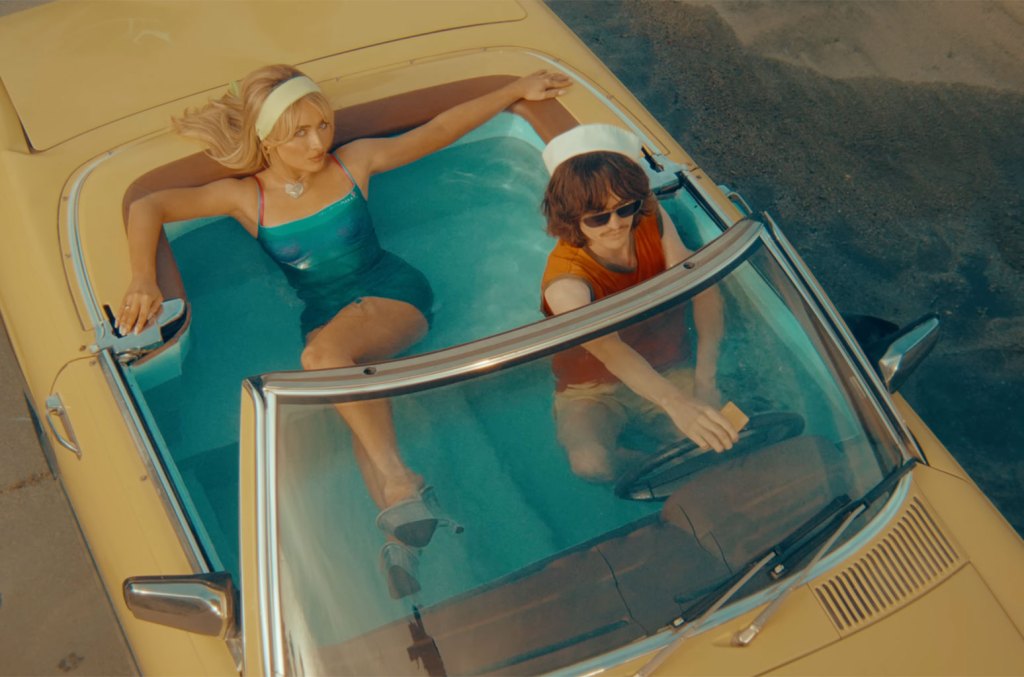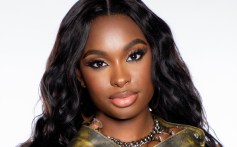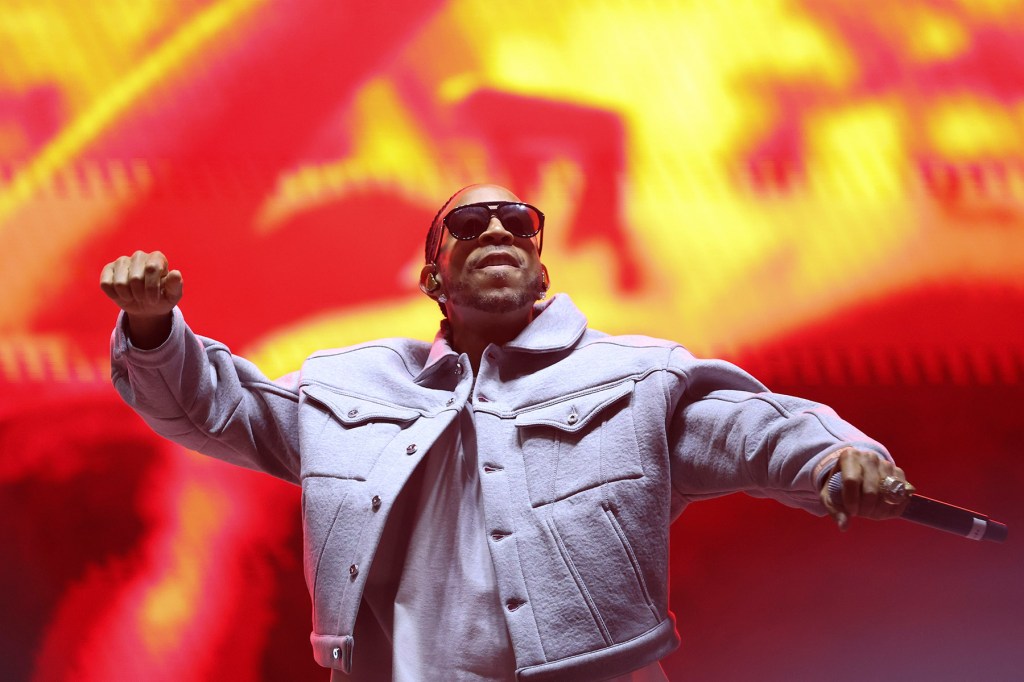Awards
Page: 13
Trending on Billboard
The BRIT Awards has announced an eligibility shake-up across a number of categories at the upcoming 2026 ceremony.
For the first time in its nearly 50 year history, The BRITs will leave London and will be held in Manchester’s Co-op Live arena. The ceremony will take place on Feb. 28 at the 23,500-capacity venue, which first opened in 2024. It will be the first time the awards have been held outside of London in its almost five-decade history; from 2011 to 2025, the ceremony was held at The O2 arena in London.
Ahead of the nomination process, The BRITs has announced a number of changes to the eligibility across certain categories. The eligibility period runs from Dec. 6, 2024, to Dec. 4, 2025.
The BRITs Rising Star Award will revert back to being called the Critics’ Choice award. The award was introduced in 2008 and is voted for by a judging panel made up of industry experts. Previous winners include Adele, Sam Smith, Sam Fender, Ellie Goulding and Florence + The Machine, and the title is currently held by Myles Smith.
The award changed its name to Rising Star in 2020, and recognizes artists who are predicted to make the biggest impact on music in the coming year. To be eligible, artists must not have yet achieved a top 20 album or more than one top 20 single on the U.K. charts.
Best new artist will change its name to breakthrough artist and honor British artists as they make their mark on the industry. The award was previously called British newcomer (1982-2002) and British breakthrough act (2003-2019) before being called best new artist from 2020 to 2025. The category recognizes artists on their achievements throughout the eligibility period and honors musicians with a greater profile than those of Critics Choice. Recent winners include The Last Dinner Party (2025), RAYE (2024) and Wet Leg (2023).
The BRITs has also announced a change in the eligibility criteria across a number of categories. Nominees in artist of the year, international artist of the year, group of the year and international group of the year will need to have achieved either a top 30 album or two top 20 singles on the Official U.K. charts in the eligibility period. Previously, artists were considered eligible if they had achieved either one top 40 album or two top 20 singles in the eligibility period.
For the Mastercard album of the year prize, the LP must have reached the top 30 on the U.K.’s Albums Chart.
In the five genre categories for alternative/rock, dance, hip-hop/grime/rap, pop and R&B, the eligibility criteria remains the same, with artists required to have achieved a top 40 album or single on the Official U.K. charts in the eligibility period.
Nominees for the BRITs are usually announced in January and are selected by members of the BRITs voting panel, which is comprised of thousands of musicians, industry experts, pundits and more. In recent years, genre categories have been voted on by the public.
In other developments for the 2026 ceremony, Stacey Tang, co-president of RCA U.K., will chair this year’s organization committee and will oversee the ceremony’s creative direction, alongside representatives from other U.K. major and independent record labels, BRITs TV and the BPI.

Trending on Billboard In addition to being likely to receive nominations on Friday Nov. 7, Sabrina Carpenter, Chappell Roan, Brandi Carlile, Doechii and more are set to announce the nominations on a livestream that begins at 8 a.m. PT/11 a.m. ET. Carpenter, who won two Grammys on the telecast in February, could be nominated for […]

Trending on Billboard
Sabrina Carpenter’s “Espresso” was the earworm of 2024, an inescapable pop smash that miraculously retained its charm even after hundreds of listens. But did you ever think a scholarly look at the song would win a Deems Taylor/Virgil Thomson Award?
One just did. The 2025 Virgil Thomson Award for outstanding music criticism in the pop music field is presented to Dan Charnas for his Slate article “The Musical History Lesson Buried Beneath the Song of the Summer.” ASCAP says the article looks at “the popular but ‘nameless’ musical genre that is the foundation” for Carpenter’s smash. (For the record, the song, which Carpenter co-wrote with Amy Allen, Steph Jones and Julian Bunetta, ranked fourth on Billboard’s 2024 Song of the Summer chart.)
The winners of the 56th annual ASCAP Foundation Deems Taylor/Virgil Thomson Awards were announced Thursday (Oct. 30). Awards are presented for outstanding books, articles, liner notes and broadcast programs on the subject of music. Established in 1967 to honor the memory of composer, critic and former ASCAP president Deems Taylor, the awards are made possible by the support of the Virgil Thomson Foundation.
Here are this year’s other winners:
Deems Taylor/Virgil Thomson Award recipients for articles published in 2024:
The award for an article in the pop music field goes to Robert Michael Marovich for his article on the prolific Black songwriter Ted Jarrett, “The Black Songwriter Who Took Nashville by Storm,” published by Zocalo Public Square.
The award for an article in the concert music field goes to Jonathan Kregor for his article “Remembering Clara Wieck in Vienna: Gender, Genius, and Genre in the Post-Beethoven Biedermeier,” published in Women’s Agency in Schubert’s Vienna.
The award for outstanding music criticism in the concert music field is presented to Kevin Bartig for his article, “Olin Downes and the Soviets,” published by the Journal of the American Musicological Society.
A runner-up award in the above category goes to Andy Zax for “Extinctophonics: The Game of Jim,” published in Third Man Records & Books’ Maggot Brain.
Deems Taylor/Virgil Thomson Broadcast/Media Award in pop music:
Director Alex Stapleton, writer Stephen Witt and producer Philip Byron for their documentary, How Music Got Free. The Paramount+ film tells the story of how technology-driven disruption changed music in the late ‘90s and early 2000s. Additional producers included Marshall “Eminem” Mathers, LeBron James, Paul Rosenberg, Maverick Carter, Jamal Henderson, Steve Berman, James Chapman, Bruce Gillmer, John Janick, Dan Sacks, Bridgette Theriault, James Thayer, Naomi Wright, Steve Stoute, Anthony Seyler, Stevenson Waite, Michael Maniaci and Malik Johnson.
Deems Taylor/Virgil Thomson Broadcast/Media Award in concert music:
Producer David Osenberg for the weekly program “Sounds Choral,” a production of WWFM, The Classical Network. The program explores the choral art form and is hosted by a rotating roster of choral conductors, composers and scholars including Ryan Brandau, Gabriel Crouch, Jason Max Ferdinand, Jacqueline Horner-Kwiatek, Christopher Jackson, James Jordan, Amanda Quist, Steven Sametz, Deborah Simpkin-King and Ethan Sperry.
ASCAP Foundation Paul Williams “Loved the Liner Notes” Award:
Lauren Du Graf for “Alice Coltrane: The Artist in Ascension” from The Carnegie Hall Concert on Impulse Records.
Runner-up awards in the above category are also given to Elizabeth Nelson for “Hours in the Colosseum: Notes on the 1974 Tour” from The 1974 Live Recordings by Bob Dylan & The Band on Sony Legacy and Shana L. Redmond for Paul Robeson – Voice of Freedom: His Complete Columbia, RCA, HMV and Victor Recordings on Sony Classical.
The “Loved the Liner Notes” Award was established in 2016 and is funded by ASCAP Foundation President Paul Williams.
Deems Taylor/Virgil Thomson Book Awards in pop music:
Joe Boyd for And the Roots of Rhythm Remain, a history of music from all over the world that influenced jazz, rhythm & blues and rock ‘n’ roll, published by Faber & Faber
Brian Wright for The Bastard Instrument: A Cultural History of the Electric Bass, published by University of Michigan Press.
A runner-up award in this category goes to Sheila Curran Bernard for Bring Judgment Day: Reclaiming Lead Belly’s Truths from Jim Crow’s Lies, published by Cambridge University Press.
Deems Taylor/Virgil Thomson Book Award in concert music:
David Suisman for Instrument of War: Music and the Making of America’s Soldiers, published by University of Chicago Press.
A runner-up award in this category goes to Mikel Rouse for The World Got Away: A Memoir, published by University of Illinois Press.
More information about The ASCAP Foundation Deems Taylor/Virgil Thomson Awards is available at their site.
Trending on Billboard The Latin Recording Academy announced on Wednesday (Oct. 29) that Maluma and Roselyn Sánchez will host the 26th Annual Latin Grammy Awards. The Colombian hitmaker will make his hosting debut. Meanwhile, Sánchez returns for the eighth time as host of the Latin Grammys, including her most recent stint in 2023. The Latin Grammys will air […]
Trending on Billboard
For months, it looked like the Grammy race for best new artist was likely to come down to Alex Warren and sombr. But a couple of things happened in the past few weeks to make the race more competitive – Olivia Dean exploded with a top 10 single on the Billboard Hot 100 (“Man I Need”) and a top 10 album on the Billboard 200 (The Art of Loving). And the Recording Academy ruled Leon Thomas eligible, even though he won a Grammy three years ago for co-writing SZA’s “Snooze.” Now, we have a real race.
With the nominations set to be announced next Friday (Nov. 7), all four of these artists certain to be nominated for best new artist, along with Lola Young. After that, it gets harder to choose, but the field will be rounded out with three other nominees, culled from a list of 337 eligible names.
Final-round voting begins Dec. 12 and extends to Jan. 5. So Dean has about six weeks for her profile to continue building before the first votes are cast.
If Dean (or Young) winds up winning, this will be the ninth year in a row that a solo woman has been named best new artist. The streak started in 2018 with Alessia Cara and has continued with Dua Lipa, Billie Eilish, Megan Thee Stallion, Olivia Rodrigo, Samara Joy, Victoria Monét and Chappell Roan.
If Warren, somber or Thomas takes the prize, they’d be the first male artist to win since Chance the Rapper in 2017.
The Marías, which span multiple genres and languages, also have a good chance of being nominated. If they were to win, they’d be the first group (defined as an act with three or more members) to take the prize since fun. in 2013. Three other groups are seen as having a reasonably good shot at a nod: Sleep Token, KATSEYE and The Red Clay Strays.
Some of the top contenders have already won new artist prizes at other shows. Warren won best new artist at the MTV Video Music Awards on Sept. 7. Thomas won best new artist at the BET Awards on June 9. Zach Top, Ella Langley and The Red Clay Strays won the new male, female, and duo/group prizes at the Academy of Country Music Awards on May 8. Myles Smith won the rising star award at the Brit Awards on March 1.
Even some acts that won new artist awards in 2024 are eligible. Megan Moroney won new artist of the year at the 2024 Country Music Association Awards and new female artist of the year at the 2024 Academy of Country Music Awards. The Red Clay Strays won emerging artist of the year at the 2024 Americana Music Honors & Awards.
(The Grammys in recent years have erred on the side of being inclusive in this category. In previous eras, they almost seemed to be looking for nitpicky reasons to kick artists out – just ask the people around Whitney Houston and Richard Marx who are probably still smarting over their exclusions.)
BigXthaPlug and Bailey Zimmerman, who collaborated on the top five Hot 100 hit “All the Way,” are competing against each other here. Sleep Token and Ken Carson, who both landed No. 1 albums on the Billboard 200, are eligible. So is Role Model, who made a vivid impression late in the eligibility year with his irresistible breakthrough hit “Sally, When the Wine Runs Out.”
Other strong contenders, not already mentioned, include Ravyn Lenae, Mariah the Scientist, Addison Rae, Jessie Murph, Gigi Perez, Riley Green, October London, Sam Fender, Reneé Rapp, PinkPantheress, Tucker Wetmore, ATEEZ, Central Cee, Lil Tecca, Parker McCollum and Keke Palmer.
The eligibility period for the 68th Grammy Awards is Aug. 31, 2024, through Aug. 30, 2025. While the Grammys set a minimum number of releases an artist must have to qualify in this category (five singles/tracks or one album), there is no maximum. Instead, the Grammys’ rules and guidelines booklet says nominations for the honor hinge on when “the artist had attained a breakthrough or prominence” — and it delegates that determination to a screening committee.
Artists are allowed to appear on the entry list for best new artist three times, after which they are ruled ineligible for future consideration.
Here are the eight leading nominees for best new artist. The artists are shown in alphabetical order, which is how they’ll be listed on the Grammy nominees list.
Olivia Dean
Trending on Billboard
Cornel Wilczek, Megan Washington and Bluey composer Joff Bush were in the winners’ circle Tuesday night, Oct. 28, as the 2025 Screen Music Awards were presented in Brisbane’s Fortitude Valley.
Explore
See latest videos, charts and news
With two donut-shaped trophies, Wilczek, the Melbourne-based composer, was the big winner on the night, taking out best music for a television drama (Fake) alongside 2024 emerging screen composer of the year champion Alex Olijnyk; plus best opening title television theme with Thomas Rouch for the Netflix adaptation of the Jane Harper book, The Survivors.
Washington, winner of several ARIA Awards, including best female artist back in 2010, now has a Screen Music Award for her collection. The homegrown talent won for best original song composed for the Screen with “Dream On,” lifted from How to Make Gravy, the film adaptation of Paul Kelly’s beloved Christmas song.
The gravy kept flowing as Electric Fields, who performed the song in the movie, closed the evening with a stunning performance, accompanied by a choir led by Deline Briscoe.
Another Queensland creative, the celebrated children’s screen composer, Joff Bush, scooped most performed screen composer – overseas for his work on Bluey, the most-streamed show in the United States in 2024. Bush won the same category in 2023.
Meanwhile, Adam Gock and Dinesh Wicks extended their impressive streak, scoring most performed screen composer – Australia for the 11th time, thanks to their work on Farmer Wants a Wife, LEGO Masters, MasterChef and Travel Guides.
Jed Kurzel nabbed feature film score of the year for the British period action-drama Tornado, his fourth win in the category after Monkey Man (2024), Slow West (2015) and Snowtown (2011).
Veteran screen composer Christopher Gordon was awarded the coveted distinguished services to the Australian screen award in recognition of his “extraordinary body of work and enduring contribution to the screen music industry.”
Legendary Australian director Bruce Beresford was on hand to present the trophy to Gordon, with whom he has collaborated on several acclaimed films including Ladies in Black and Mao’s Last Dancer.
“I feel like such an imposter, there are so many people worthy of this award,” Gordon remarked, before exploring his self-destructive 20s and how he got a fresh, healthier mindset through his connections with the Screen Writers Guild. “I got my life together.” He continued, “the support that I felt and the sense of community with other composers was extremely important for me.” He also discussed the drought he experienced between film scores, something every creative needs to prepare for. “You really need patience in this business.”
Stage and screen star David Wenham hosted the ceremony alongside Mark Coles Smith and Nathalie Morris, with Erkki Veltheim returning as music director, helming a live orchestra performing selections from nominated works.
The evening got away with a bloody Halloween trick, with a creepy orchestral piece set to a grisly edit from Wolf Creek, the horror film which this year celebrates its 20th anniversary.
Wenham would describe the moment as “probably the most terrifying opening to an awards, ever.” It was a good thing the hundreds of guests at Fortitude Music Hall had finished their dinner.
Presented for the first time in the Sunshine State, the annual ceremony is an initiative of APRA AMCOS and the Australian Guild of Screen Composers (AGSC).
During his third and final speech leading the AGSC as president, Dale Cornelius touched on streaming quotas, AI, the human condition and more. Cornelius will hand the reins over to composer and Go-Betweens great Amanda Brown, who was in the audience, but not before he returned to the stage to collect the win for best music for a short film, for The Way Home.
Timing is everything. And, with the federal government on Monday ruling out a controversial proposed exemption to the Copyright Act that would allow for text and data mining, the timing wasn’t lost on guests and speakers.
“This is a massive win,” Jenny Morris, chair of APRA AMCOS, remarked from the podium. And not just for APRA AMCOS members, “but for every creator in the room and the country.” She continued, “we said ‘no.’ And importantly, we said no together…when we unite, when we speak with one voice, we are unstoppable.”
The music community, she continued, had real cause to celebrate after a such an “historic” victory.
Click here for the full list of 2025 Screen Music Awards winners.
Trending on Billboard
Chappell Roan won’t be eligible for induction into the Rock & Roll Hall of Fame until 2042 — 25 years after the release of her first commercial recording — but she’ll have a chance to check out the proceedings on Saturday, Nov. 8, when she is a guest at the 2025 Induction Ceremony. The Killers, who become eligible for Rock Hall membership much sooner, in 2028, have also joined the lineup.
The 40th annual Rock & Roll Hall of Fame ceremony is set for the Peacock Theater in Los Angeles. Previously announced guests who will take the stage to present, perform and honor this year’s inductees are Beck, Brandi Carlile, David Letterman, Doja Cat, Elton John, Flea, Iggy Pop, J.I.D, Killer Mike, Maxwell, Missy Elliott, Olivia Rodrigo, Questlove, RAYE, Sleepy Brown, Taylor Momsen, Teddy Swims and Twenty One Pilots.
As previously announced, this year’s inductees are Bad Company, Chubby Checker, Joe Cocker, Cyndi Lauper, Outkast, Soundgarden and The White Stripes, along with Salt-N-Pepa and Warren Zevon for Musical Influence, Thom Bell, Nicky Hopkins, and Carol Kaye for Musical Excellence and Lenny Waronker for the Ahmet Ertegun Award.
The induction ceremony will stream live coast-to-coast on Disney+ on Saturday, Nov. 8, at 8 p.m. ET, and will be available to stream following the ceremony. ABC will air a primetime special with performance highlights and standout moments on Thursday, Jan. 1, at 8:00 p.m. ET, available the following day on Hulu.
Fans who wish to attend the ceremony in person can purchase tickets at AXS.com.
The 2025 Inductee Exhibit at the Rock & Roll Hall of Fame in Cleveland is set to open to the public on Oct 31. It will feature artifacts such as Lauper’s handwritten lyrics to “Time After Time”; the outfits worn by Meg White and Jack White on the cover of The White Stripes’ Icky Thump; a 1979 Gibson Les Paul electric guitar played by Chris Cornell of Soundgarden; and outfits worn by the members of Outkast including the outfit Andre 3000 wore in the “Hey Ya!” music video.
Who qualifies for the Rock Hall? According to their site: “Artists — a group encompassing performers, composers and/or musicians — become eligible for induction 25 years after the release of their first commercial recording. Besides demonstrating unquestionable musical excellence and talent, inductees will have had a significant impact on the development, evolution and preservation of rock n’ roll.”
Billboard’s Live Music Summit will be held in Los Angeles on Nov. 3. For tickets and more information, visit the event’s website.
Trending on Billboard
Telemundo’s live broadcast of the Billboard Latin Music Awards 2025 on Thursday (Oct. 23) ranked as the No. 1 entertainment show in prime time, regardless of language, among adults 18-49, according to Nielsen.
The report, released Oct. 28, further adds that with a total of 1.7 million total viewers, the three-hour ceremony was also the No. 1 awards show on Spanish-language television year-to-date among adults 18-49, and the highest rated Billboard Latin Music Awards among total viewers since 2019.
This year’s star-studded show included performances by Daddy Yankee, Grupo Frontera, Emilia, Carlos Vives, Xavi, Wisin, Arthur Hanlon, Netón Vega and Óscar Maydon, to name a few. Special awards were also handed out to Bad Bunny — who was honored with the Top Latin Artist of the 21st Century Award — Elvis Crespo entered the Billboard Hall of Fame, Laura Pausini was recognized with the Icon Award and Peso Pluma received the first-ever Billboard Vanguard Award.
Locally, the awards show ranked No. 1 regardless of language in Los Angeles, New York, Miami, Phoenix, Orlando and Philadelphia. Furthermore, the event achieved 159.5 million digital and social video views, up +50% from the 2024 edition and 12.5 million social actions, up +229% year over year across Telemundo.com, the Telemundo App, Peacock, Facebook, Instagram, YouTube and TikTok.
Hosted by Elizabeth Gutiérrez, Goyo and Javier Poza, the big winners of the night were Bad Bunny, Karol G and Fuerza Regida. Bunny took home 11 awards. Karol G followed closely with six awards, Fuerza Regida collected five, while Peso Pluma, Netón Vega and Óscar Maydon were multiple award winners.
Trending on Billboard Grammy-winning artist Kali Uchis, five-time Grammy nominee Kehlani, and KPop Demon Hunters’ songwriter, lead vocalist and rising star EJAE will be honored at the 17th annual ASCAP Women Behind the Music. The event is set for Wednesday, Nov. 12, in Los Angeles. Kehlani, a five-time Grammy nominee, received the Rule Breaker Award […]
Trending on Billboard
Rapper, actor and philanthropist Ludacris is set to perform at the 2025 Baby2Baby Gala honoring tennis legend Serena Williams. The gala, presented by Paul Mitchell, will be held Saturday, Nov. 8, in Los Angeles. Baby2Baby is a national nonprofit that provides critical items to children in need across the U.S.
Previous performers at the event include 50 Cent, Snoop Dogg and Nelly.
Ludacris has amassed five No. 1 hits on the Billboard Hot 100, including two as a lead artist: “Money Maker” (featuring Pharrell) and “Stand Up” (featuring Shawnna). He has landed four No. 1 albums on the Billboard 200 and has won three Grammy Awards, including best rap album for Release Therapy, one of his No. 1 albums.
Chris “Ludacris” Bridges made a seamless transition to acting, including the role of Tej in the Fast & Furious franchise, where he was introduced in 2003’s 2 Fast 2 Furious. As a father of four girls, his latest ventures include launching KidNation, an educational platform devoted to the enrichment of children. In addition, Bridges created the animated series KARMA’S WORLD on Netflix, which is awaiting its fifth season.
Williams will receive the Giving Tree Award, which is awarded annually to a public figure who has demonstrated exceptional commitment to improving the lives of children in need. Past honorees include Charlize Theron, Salma Hayek Pinault, Kim Kardashian, Kerry Washington, Jennifer Garner, Gwyneth Paltrow, Jessica Alba, Kate Hudson, Amy Adams, Drew Barrymore, Chrissy Teigen and Vanessa Bryant.
Last year’s Baby2Baby Gala raised a record $17 million in support of Baby2Baby’s mission. In the last 14 years, Baby2Baby has distributed more than 500 million essential items, including diapers, formula and clothing.
Baby2Baby’s Disaster Relief & Emergency Response Program has responded to the needs of children in more than 100 disasters. This year, Baby2Baby announced the expansion of their initiative to combat the maternal health crisis to 15 states. To learn more about Baby2Baby, visit their site.

 State Champ Radio
State Champ Radio 




